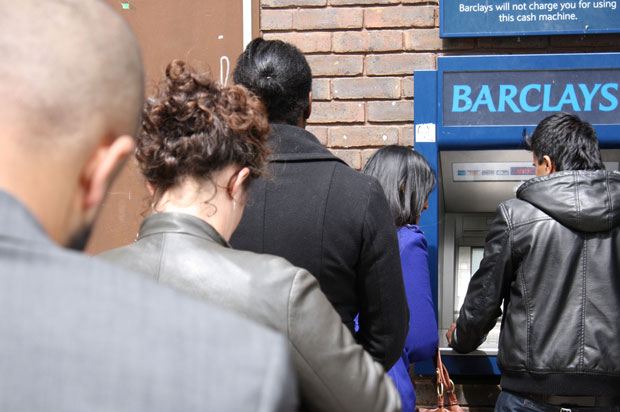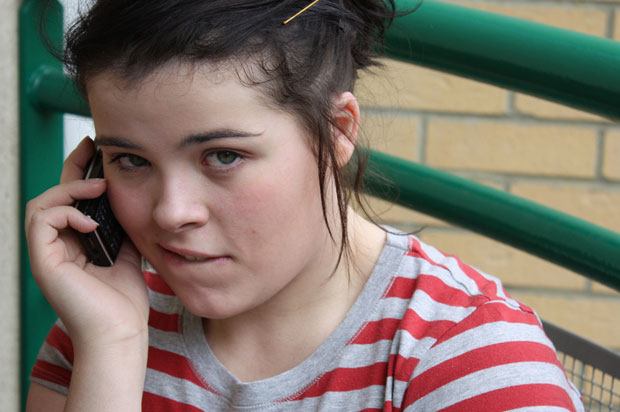Problems with your bank
What happens when your bank lets you down?

The queue for the cashpoint is just the beginning...
What happens when your bank lets you down? Most of us will encounter bank problems at some point, but we’re here to help!
I can’t open an account
Your bank or building society doesn’t have any obligation to open a bank account for you. They can choose who their customers are (although they can’t discriminate on the grounds of race, sex, disability, religion or sexuality).
If you can’t open a regular bank account your bank should allow you to open a basic bank account, read more here.
My bank has charged me too much on my overdraft
Banks are allowed to set their own charges, which should have been set out in the terms and conditions when you joined the bank. They must give you at least 30 days’ notice if they change any terms and conditions.
My bank has gone out of business
Of course, you might worry that your bank going out of business will cause you bank problems. As worrying as it is, and despite the recent financial woes, it’s unlikely that a bank will go totally out of business. If a bank becomes unable to operate it will usually be taken over, either by another bank or by the Government.
No matter what, if your bank is registered in the UK, your first £85,000 is protected. So any cash in a current account, savings account or cash ISA will be protected up to this maximum. Debts like loans are treated differently so you would still owe this money to the defaulted bank. If your bank is not registered in the UK but is based in the European Economic Area (EEA), you should be able to claim in that country.
Money goes out of my account without my authorisation
If a bank makes a mistake by wrongly removing money from your account then this can cause you bank problems. In short, they must refund it and any costs you incurred by not having the money in your account (e.g. if you went overdrawn or you missed a credit card payment).
If someone else takes money out of your account without your permission, or you suspect that they may be able to (such as you lose your debit card), you must notify your bank immediately. As long as you acted reasonably, you won’t lose more than £50, although often a bank will ensure you don’t lose a penny. Learn about shopping safely online here.
My bank uses money from one account to pay for another account
If you have more than one account with the same bank they are allowed to take money from one account to pay for charges or being overdrawn on another.
However, even if you are overdrawn you do still have the right to choose how any further money paid into your account is used i.e. for paying your mortgage or your rent. This is called the ‘first right of appropriation’.
So, if you are expecting a payment to be made into your account, make sure you write to your bank before the funds arrive instructing them how you wish to spend the money. You will have to do this EACH TIME you expect a deposit.
Extra money is put into my account
Unlike Monopoly, a bank error in your favour doesn’t mean you get to keep the cash. The bank has the right to recover the money.
If you’ve already spent the money, the bank will usually allow you to pay it back in interest-free instalments. In some instances, if you didn’t realise the bank had made an error and spent the money in good faith, they might let you keep the money.
However, if you don’t return the money you could be taken to court for theft.
How to complain about a bank
If you think your bank has made a mistake, then you have every right to complain. Here’s a quick step-by-step guide for how to complain about a bank:
- Make sure the complaint is genuine. Your bank isn’t at fault if you let someone else take money out of your account (e.g. if you give someone else your card and pin).
- Collect written evidence of the problem (statements, letters etc) and arrange a meeting with the person dealing with your account, or a branch manager. Alternatively, put it in writing and send it to your bank.
- If you’re not satisfied with the response, ask for the bank’s complaints procedure and follow that. After eight weeks, if you’re still not happy you can contact the Financial Ombudsman Service.
- Finally, you can consider going to court. This can be expensive, and you’ll need expert legal advice.
If you’re still looking for more on banking, money and other financial matters, check out these links:
Next Steps
- Youth Legal offers free legal advice to young people aged 16-25 in the London area on issues concerning housing, homelessness, social care, debt and immigration. Get advice by calling 020 3195 1906 or emailing [email protected].
- Chat about this subject on our Discussion Boards.
By Holly Turner
Updated on 02-Jul-2021
No featured article














